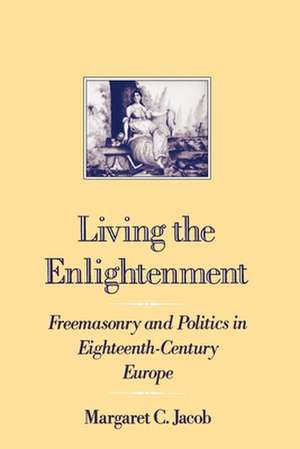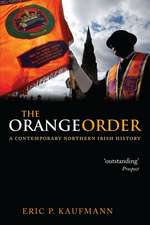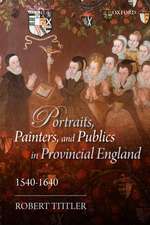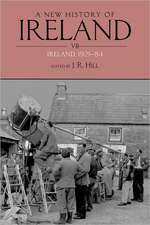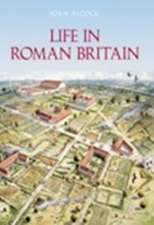Living the Enlightenment: Freemasonry and Politics in Eighteenth-Century Europe
Autor Margaret C. Jacoben Limba Engleză Paperback – 30 sep 1992
was constitutionally constructed and logically egalitarian. Originating in the Middle Ages, when stone-masons joined together to preserve their professional secrets and to protect their wages, the English and Scottish lodges had by the eighteenth century discarded their guild origins and become an
international phenomenon that gave men and eventually some women a place to vote, speak, discuss and debate. Margaret Jacob argues that the hundreds of masonic lodges founded in eighteenth-century Europe were among the most important enclaves in which modern civil society was formed. In France,
the Netherlands, Belgium, and Britain men and women freemasons sought to create a moral and social order based upon reason and virtue, and dedicated to the principles of liberty and equality. A forum where philosophers met with men of commerce, government, and the professions, the masonic lodge
created new forms of self-government in microcosm, complete with constitutions and laws, elections, and representatives. This is the first comprehensive history of Enlightenment freemasonry, from the roots of the society's political philosophy and evolution in seventeenth-century England and
Scotland to the French Revolution. Based on never-before-used archival sources, it will appeal to anyone interested in the birth of modernity in Europe or in the cultural milieu of the European Enlightenment.
Preț: 603.73 lei
Preț vechi: 784.07 lei
-23% Nou
Puncte Express: 906
Preț estimativ în valută:
115.52€ • 120.62$ • 95.39£
115.52€ • 120.62$ • 95.39£
Carte tipărită la comandă
Livrare economică 15-29 aprilie
Preluare comenzi: 021 569.72.76
Specificații
ISBN-13: 9780195070514
ISBN-10: 0195070518
Pagini: 320
Ilustrații: 9 halftones
Dimensiuni: 155 x 233 x 15 mm
Greutate: 0.45 kg
Editura: Oxford University Press
Colecția OUP USA
Locul publicării:New York, United States
ISBN-10: 0195070518
Pagini: 320
Ilustrații: 9 halftones
Dimensiuni: 155 x 233 x 15 mm
Greutate: 0.45 kg
Editura: Oxford University Press
Colecția OUP USA
Locul publicării:New York, United States
Descriere
Long recognized as more than the writings of a dozen or so philosophes, the Enlightenment created a new secular culture populated by the literate and the affluent. Enamoured of British institutions, Continental Europeans turned to the imported masonic lodges and found in them a new forum that was constitutionally constructed and logically egalitarian. Originating in the Middle Ages, when stone-masons joined together to preserve their professional secretsand to protect their wages, the English and Scottish lodges had by the eighteenth century discarded their guild origins and become an international phenomenon that gave men and eventually some women a place to vote, speak, discuss and debate. Margaret Jacob argues that the hundreds of masonic lodges founded ineighteenth-century Europe were among the most important enclaves in which modern civil society was formed. In France, the Netherlands, Belgium, and Britain men and women freemasons sought to create a moral and social order based upon reason and virtue, and dedicated to the principles of liberty and equality. A forum where philosophers met with men of commerce, government, and the professions, the masonic lodge created new forms of self-government in microcosm, complete with constitutions andlaws, elections, and representatives. This is the first comprehensive history of Enlightenment freemasonry, from the roots of the society's political philosophy and evolution in seventeenth-century England and Scotland to the French Revolution. Based on never-before-used archival sources, it willappeal to anyone interested in the birth of modernity in Europe or in the cultural milieu of the European Enlightenment.
Recenzii
`What [Jacob] does do very well is to take us behind the scenes to listen to little groups of people, in one or two eighteenth-century European cities, as they lived their social and intellectual lives in the muddle of ideas, ideals, prejudices, assumptions and social aspirations that make up life as people live it. For that we can all be grateful to her.'French History
`A model of the new intellectual history. There have been many calls for a `social history' of the Enlightenment, but few have actually achieved one, and none in such grand fashion. Jacob gets beyond the symbolism and ritual to place Freemasonry squarely within the social and political contexts of eighteenth-century Europe, and the unique breadth of her archival work gives the book a genuine comparative core. This pioneering study—bold, comprehensive, and vivid—is likely tobe the standard work on the subject for years to come.'Gary Kates, Trinity University
a welcome and overdue attack on a subject touched on by Mornet sixty years ago ... a major step towards an account of masonry which satisfactorily integrates it with other sides of the eighteenth century ... Professor Jacob has thoroughly and extensively set out the cultural reality which underlay so much anti-masonic polemic ... Professor Jacob ought to be widely read
scholarly, ground-clearing...It is in Amsterdam that Jacob has made the greatest in-roads into the hitherto closed world of Dutch Freemasonry and she has uncovered an embarrassment of archival riches.
`A model of the new intellectual history. There have been many calls for a `social history' of the Enlightenment, but few have actually achieved one, and none in such grand fashion. Jacob gets beyond the symbolism and ritual to place Freemasonry squarely within the social and political contexts of eighteenth-century Europe, and the unique breadth of her archival work gives the book a genuine comparative core. This pioneering study—bold, comprehensive, and vivid—is likely tobe the standard work on the subject for years to come.'Gary Kates, Trinity University
a welcome and overdue attack on a subject touched on by Mornet sixty years ago ... a major step towards an account of masonry which satisfactorily integrates it with other sides of the eighteenth century ... Professor Jacob has thoroughly and extensively set out the cultural reality which underlay so much anti-masonic polemic ... Professor Jacob ought to be widely read
scholarly, ground-clearing...It is in Amsterdam that Jacob has made the greatest in-roads into the hitherto closed world of Dutch Freemasonry and she has uncovered an embarrassment of archival riches.
